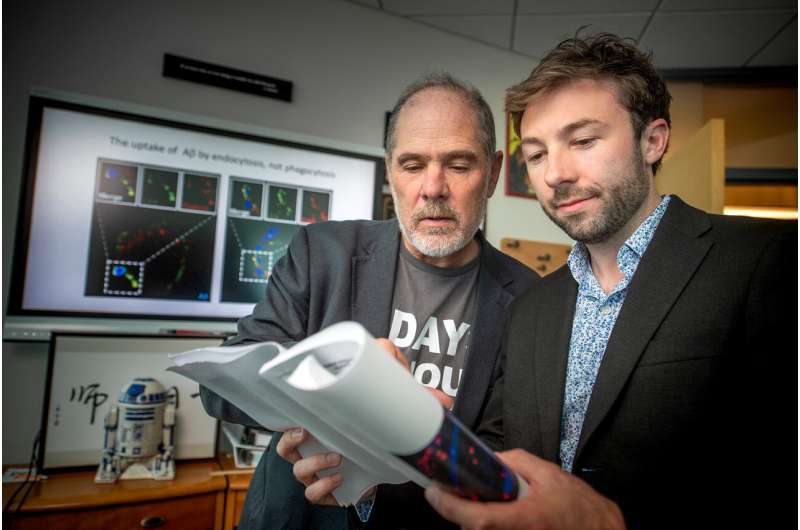Pathway discovered that prevents buildup of Alzheimer's protein

St. Jude Children's Research Hospital scientists have discovered a pathway that functions like a car wash to prevent the buildup of a toxic protein associated with Alzheimer's disease. The report appeared online today in the journal Cell.
The findings in a mouse model of Alzheimer's offer a possible new approach to treatment of the chronic neurodegenerative disorder, which is the sixth leading cause of death in the U.S. The newly identified pathway also helps regulate inflammation, so the discovery could yield strategies for unleashing the immune response against malignant brain tumors.
Researchers called the pathway LC3-associated endocytosis or LANDO. They found the pathway in microglial cells, the primary immune cells of the brain and central nervous system. However, preliminary evidence suggests LANDO is a fundamental process that functions in cells throughout the body.
Investigators showed that LANDO protected against deposits of neurotoxic β-amyloid protein in mice. Activation of the pathway also guarded against toxic neuroinflammation and neurodegeneration, including memory problems.
"In the context of neurodegenerative diseases such as Alzheimer's, activating LANDO in microglial cells could prove to be therapeutically beneficial through increased clearance of β-amyloid and mitigation of neuroinflammation," said corresponding author Douglas Green, Ph.D., chair of the St. Jude Department of Immunology.
While activation of LANDO appears to protect against neurodegenerative disease, first author Bradlee Heckmann, Ph.D., a postdoctoral fellow in Green's laboratory, said inhibiting the pathway might boost the effectiveness of cancer immunotherapy. "Although in its infancy, preliminary data using a primary brain tumor model suggests that inhibition of LANDO might provide a mechanism to activate inflammation within the tumor microenvironment to generate an anti-tumor response," Heckmann said.
Car wash
β-amyloid protein accumulation in neurons is a hallmark of Alzheimer's. Scientists knew microglial cells take up β-amyloid proteins. Discovery of the LANDO pathway answers questions about what comes next.
Heckmann compared LANDO to the operator of an automatic carwash. In this case, the cars are the receptors on the microglial cells that bind to neurotoxic β-amyloid proteins and bring the protein into the car wash. And, just as cars return to the streets after the dirt is gone, when the β-amyloid is disposed of, the receptor returns to the microglial surface where it can pick up additional β-amyloid.
An automatic car wash depends on hardware to attach the car to a track that moves it through the machine. Similarly, several proteins are required for LANDO functioning. The proteins—Rubicon, Beclin 1, ATG5 and ATG7—are better known for their roles in a related cell pathway used to recycle unneeded and unwanted cell components. These proteins decline with age as their expression decreases.
Follow the data
"You never know where science will lead," Green said. "This project started because we were studying immune responses against cancer. Brad recognized the findings had relevance to a disease not of children but of older people.
"That's how science works. When you follow the data, you never know where it will lead."
More information: Cell (2019). DOI: 10.1016/j.cell.2019.05.056



















